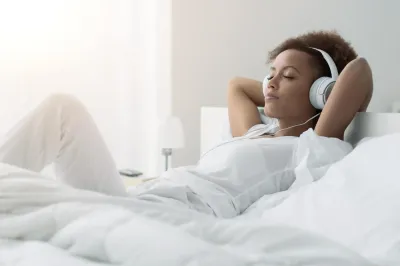Can Music Help You Sleep? Exploring the Power of Music
Ana Marie Schick: Resident Sleep Expert and Certified Health Coach • May 24, 2024

Key Takeaways
Calming music before bed helps the brain and body transition into sleep.
- Music can shorten the time it takes to fall asleep and improve sleep quality.
- Calming tracks slow heart rate and breathing, supporting a smoother wind-down.
- Music may lower cortisol, which is linked to stress.
- Listening to music triggers dopamine release, helping boost positive emotions and easing discomfort.
Below, we explore the most recent scientific findings to uncover how different types of music can positively impact your sleep cycle. There is a harmonious connection between music and a good night's sleep, providing you with practical advice on integrating music into your nightly routine.
Can Music Help You Fall Asleep?
Have you heard the saying, "Music soothes the savage beast"? Well, it's true.
Listening to music enhances sleep for two reasons: it can help you fall asleep faster while improving sleep quality.
First, listening to relaxing tunes can relax your mind and body, making you more likely to drift off and fall asleep.
Second, studies show that certain kinds of calming music alone—like soft classical or nature sounds—can slow down your heart rate and breathing patterns over time when played during nap or bedtime. [1] This helps calm your nervous system and allows for better quality sleep overall.
So, if you're having trouble sleeping at night, try playing one of these songs in the background:
- "Hush" by Deepak Chopra
- "A Heart Full of Love" from The Sound of Music soundtrack
Music Affects Sleep: Falling asleep listening to music, can improve the quality of your sleep. According to studies, specific types of music, such as soft classical or nature sounds, can help slow down your heart rate and breathing patterns, which in turn calms your nervous system and helps you sleep better. [2]
Therefore, playing specific types of music or sounds during nap or bedtime can help you sleep.
Unlock Better Sleep with The Chilipad Sleep Systems
From optimizing your sleep environment to complementing your new music-based sleep routine, our sleep systems are designed to help you get the restful night you deserve.
Science About Music and Sleep
Why does music affect sleep? Research from the Mayo Clinic and Bloomberg confirms that music is a highly effective relaxation method for both adults and children, aiding in falling asleep. Additionally, the right kind of music can help maintain sleep throughout the night, leading to a more refreshed awakening.
Calming, instrumental music without lyrics, mainly classical, is ideal for sleeping. Such music is proven to help relax the body and quiet the mind, resulting in improved and extended sleep quality.
According to various studies, listening to music before bedtime can improve the quality of sleep as it positively impacts the regulation of hormones in the body. [3]
One such is the stress hormone cortisol, which is known to cause stress and increase alertness. Elevated levels of cortisol can lead to poor sleep. However, listening to music can lower cortisol levels, making people feel relaxed and less stressed. Therefore, music can be an effective way to ease stress and promote better sleep.
"Music has a solid evidence base as one of the better-researched non-pharmacological sleep aids that can improve individual’s sleep, both in terms of insomnia and the quality of sleep.” - Thomas Dickson, Music Psychology Researcher, Ph.D
Songs That Can Help You Fall Asleep and Stay Asleep
Certain types of music can significantly assist in falling asleep and staying asleep throughout the night. This effectiveness largely stems from specific characteristics inherent in sleep music, which encourage relaxation and pave the way for a sleep-conducive state.
Whether for helping a child or yourself, below are the characteristics and the types of music that exemplify them:
Slow, Relaxing Songs
Music with a slow tempo, such as "You Are My Sunshine" by Jimmie Davis, can help slow down the mind and body. Slow rhythms can lower heart rate and breathing, creating a calming effect. [4] The gentle pace of these types mirrors the body's natural pre-sleep state, making it easier to transition into sleep.
Improving the quality of sleep can be found in others such as "Gravity" by John Mayer and "Come Away with Me" by Norah Jones.
Simple Rhythms and Melodies
Songs that are simple and straightforward, like the famous lullaby "Twinkle Twinkle Little Star," "Hush Little Baby," and "Somewhere Over the Rainbow," are all compelling because they are easy to process and don't require much mental effort to follow.
Others that aid sleep also include "Let It Be" by the Beatles and "Fast Car" by Tracy Chapman. This simplicity of the songs can help the brain relax, reducing cognitive load and allowing the listener to drift off to sleep more easily resulting in a better night's sleep.
Repetitive Songs with Predictable Patterns
Nursery rhymes like "Three Blind Mice," with repetitive and predictable patterns, are particularly conducive to sleep. Other include "Strawberry Swing" by Coldplay and "Heros" by David Bowie. The repetition and predictability of the songs create a sense of familiarity and comfort.
This predictability doesn't demand active listening or engagement from the brain, allowing it to enter a more relaxed state conducive to deep sleep.
Related Blog: The Significance of Light Sleep: What You Need to Know
These types of music share common traits: they are calming and non-stimulating and provide a soothing auditory backdrop that may mask distracting noises.
The goal is to create an auditory environment that supports the natural process of winding down and preparing the body and mind for sleep. By carefully selecting music with these qualities, you can significantly enhance the likelihood of getting better sleep and reduce sleepless nights.

What Kind of Music Can Help You Sleep?
Music with longer, slower rhythms can significantly enhance your sleep, helping you sleep better by falling asleep faster and enjoying deeper sleep.
Music with slower tempos, ideally around 60 beats per minute or less, are typically more effective for influencing sleep than faster-paced songs.
Instrumental music is particularly beneficial for sleep as it minimizes distractions. You can easily slip into a tranquil state of mind without focusing on lyrics or the artist's persona.
In cases where they do have lyrics, those that are repetitive and simple—much like the soothing effect of "Twinkle Twinkle Little Star." This type of music allows your mind to relax and gently drift into a peaceful night's rest.
Sleep Tip: To enhance sleep, avoid songs with complex lyrics, intense beats, or tunes that elicit strong emotional responses.
The Best Kind of Sleep Music:
There are various types of relaxing music for sleep, including:
- Relaxing Classical Music
- Atmospheric or Ambient Music
- Nature and Sound Waves
- Soft Jazz
- Meditative Music
- Soft Pop or Acoustic Music
Soothing Music
This type of music typically doesn’t include vocals, including jazz, solo piano, instrumental, and classical. Research claims soothing music may improve sleep by slowing your breathing and heart rate and reduced blood pressure. [5]
Nature Sounds
In 2017, scientists from Brighton and Sussex Medical School found that people who listened to natural noises had an increase in the activity of their rest-digest nervous system, which is associated with calming effects. [6] Some sounds include rain, thunder, ocean waves, birds chirping, and more.
Listening to calming music can significantly improve your sleep quality. If you're interested in exploring nature sounds and sound waves, enjoy Jason Campbell's soothing collections. These soundscapes are specifically designed to relax your mind and body, helping you drift into a peaceful sleep.
Meditation Music
Music has been proven in previous studies to be an effective sleep aid. Research has demonstrated that sleep meditation music can effectively decrease anxiety, enhance sleep quality, and induce relaxation. One study found that the use of sleep meditation music helped individuals with insomnia fall asleep quicker and sleep more deeply. [7]
Music research has found that it’s not so much the genre of music as certain characteristics of musical pieces that make us relax.
Here’s what experts have learned about the characteristics of music that are most amenable to sleep. [8]
- Music was 60 to 80 beats per minute (bpm) – considered relatively slow.
- Frequency was in the middle range.
- Notes were in the major mode (as opposed to minor, such as some jazz tunes).
- The articulation was legato (smooth).
- The tempo was medium.
- Lyrics were present.
Admittedly, we were somewhat surprised that lyrics were considered musical attributes that improved sleep. However, this brings up the point of experimenting with musical selections that work best for you.
How to Make Music Part of Your Sleep Routine
The beauty of making music part of your sleep routine is that it can really be an enjoyable project. You can download our app, listen to relaxing soundscapes, browse YouTube videos to your heart’s content, or download music apps to develop your perfect bedtime playlist.
Below are a few guidelines to get you started:
Make it a Nightly Habit
Developing a consistent nightly routine can be extremely beneficial for getting a good night's sleep. Incorporate soothing and familiar music into your bedtime rituals in order to give your body the time it needs to relax and let go of the day's stresses.
Music Tip: Listen to your music for about 30 minutes before lying down.
Select the Right Type of Music
It is not recommended to listen to music that evokes powerful feelings while trying to sleep; instead, opt for neutral or cheerful music. This includes smooth and flowing, without abrupt changes—music with a medium to slow tempo either, not too fast or too slow.
Play Enjoyable Songs
If the existing music you are listening to is not providing the desired calming effect, consider creating a personalized mix of songs. Tempo is important, as some people prefer slower-paced music while others find solace in faster tunes. Feel free to change your music choices anytime and find the best sound for your needs.
Music Tip: As mentioned earlier, select music with a relatively slow beat (60 to 80 bpm). But, some individuals might prefer more upbeat music.
Earbuds vs. Speakers for Sleep
Great news for music lovers: earbuds are a possible sleeping option! Many find traditional speakers too loud while sleeping, but earbud-style headphones offer a more comfortable alternative. Plus, they are less likely to disturb your sleep. If your partner is sleeping nearby, they do not disturb their sleep.
However, a few potential drawbacks of sleeping with earbuds are worth noting. Extended use, especially when sleeping, might make the earbuds' fit uncomfortable. It's a good idea to try out various types to find the most comfortable fit for extended wear.
Moreover, some health experts caution against wearing any ear devices while sleeping, as they could potentially affect blood flow in the ear area.
A study in the journal Noise and Health on adolescents' portable music listening habits found that while some of the study participants listen at moderate levels for short periods, about 10% listen at high volumes (90-100 dB) for extended durations, including during sleep, potentially risking future noise-induced hearing impairments. [9]
If you find that music or white noise helps you sleep better, don't hesitate to continue using it as part of your bedtime routine.
Conclusion
Suffering from poor sleep can be exhausting. We hope that this article has helped you understand how music therapy can help you sleep better. It's clear why so many people listen to music as part of their nightly routine and sleep aid. If you’re looking for a little extra help with your sleep problems, then we highly recommend giving these tips a try!
Not only does the right kind of music help you fall asleep quickly, but it also has the potential to lower blood pressure and foster a more restful night. As a few tips for incorporating music into your sleep routine, consider choosing slow and instrumental tracks, ensuring the volume is low enough to be calming, and experimenting with different genres to find what works best for you.
Remember, the goal is to create a relaxing environment that signals to your body it's time to wind down. The power of music in enhancing sleep quality is an invaluable tool in your journey towards better sleep and overall well-being.
Frequently Asked Questions About Music and Sleep
Can Listening to Music Really Help You Sleep?
Absolutely! Research shows that calming tunes can lower your heart rate, reduce cortisol levels, and ease your mind into a sleep-ready state. The right playlist might just be your new sleep superpower.
What Type of Music Is Best for Falling Asleep?
Soft, slow-tempo music—like classical, ambient, or acoustic—is ideal for promoting deep relaxation. Aim for songs with a tempo of around 60–80 beats per minute to sync with your natural resting heart rate.
Can You Listen to Your Favorite Music to Help Fall Asleep Quickly?
Yes, but choose wisely! If your favorite tracks are calming and mellow, they can absolutely ease you into dreamland. However, if your playlist is packed with high-energy beats or emotional anthems, it might actually keep your brain buzzing. Stick to soothing favorites with slower tempos to get the best sleep boost.
What Are the Best Tips for Using Music to Improve Sleep?
- Choose instrumental or low-lyric music to avoid mental stimulation
- Keep volume low and steady to create a calming backdrop
- Create a consistent nighttime playlist to cue your brain
- Avoid sudden loud songs or energetic genres like rock or pop
- Pair music with other relaxing rituals, like deep breathing or stretching
Peer-Reviewed Research References
-
Low, P.
Overview of the Autonomic Nervous System.
Merck Manual Consumer Version, 2020.
Study Type: Medical Education Resource
Key Finding: The autonomic nervous system regulates involuntary physiological processes such as heart rate, blood pressure, and stress response, playing a central role in relaxation, sleep, and emotional regulation.
View Resource
Source URL: https://www.merckmanuals.com/home/brain,-spinal-cord,-and-nerve-disorders/autonomic-nervous-system-disorders/overview-of-the-autonomic-nervous-system
-
Darki, C., Riley, J., Dadabhoy, D. P., Darki, A., & Garetto, J.
The Effect of Relaxing Classical Music on Heart Rate, Blood Pressure, and Mood.
Cureus, 2022.
Study Type: Controlled Physiological Intervention Study
Key Finding: Listening to relaxing classical music significantly reduced heart rate and blood pressure while improving mood, indicating activation of parasympathetic nervous system responses.
View Study
Source URL: https://www.ncbi.nlm.nih.gov/pmc/articles/PMC9417331/
-
Koelsch, S., Fuermetz, J., Sack, U., et al.
Effects of Music Listening on Cortisol Levels and Propofol Consumption.
Frontiers in Psychology, 2011.
Study Type: Clinical Experimental Study
Key Finding: Music listening reduced cortisol levels and anesthetic requirements, demonstrating music’s ability to lower stress and modulate physiological arousal.
View Study
Source URL: https://www.frontiersin.org/articles/10.3389/fpsyg.2011.00058/full
-
Lai, H.-L., & Good, M.
Music Improves Sleep Quality in Older Adults.
Journal of Advanced Nursing, 2005.
Study Type: Randomized Controlled Trial
Key Finding: Regular bedtime music listening significantly improved sleep quality, reduced sleep latency, and enhanced overall sleep satisfaction in older adults.
View Study
Source URL: https://onlinelibrary.wiley.com/doi/10.1111/j.1365-2648.2004.03281.x
-
Ellis, R. J., & Thayer, J. F.
Music and Autonomic Nervous System (Dys)function.
Music Perception, 2010.
Study Type: Theoretical & Physiological Review
Key Finding: Music can influence autonomic balance by enhancing parasympathetic activity and reducing stress-related sympathetic dominance, with implications for sleep and emotional regulation.
View Study
Source URL: https://doi.org/10.1525/mp.2010.27.4.317
-
University of Sussex.
It’s True: The Sound of Nature Helps Us Relax.
ScienceDaily, 2017.
Study Type: University-Led Experimental Study Summary
Key Finding: Natural sounds such as water, wind, and birdsong reduced stress and promoted relaxation by lowering physiological arousal and sympathetic nervous system activity.
View Resource
Source URL: https://www.sciencedaily.com/releases/2017/03/170330132354.htm
-
Trahan, T., Durrant, S. J., Müllensiefen, D., & Williamson, V. J.
The Music That Helps People Sleep and the Reasons They Believe It Works.
PLOS ONE, 2018.
Study Type: Mixed-Methods Survey Study
Key Finding: Music used for sleep is typically slow, predictable, and emotionally soothing, helping listeners reduce cognitive arousal and transition into sleep.
View Study
Source URL: https://doi.org/10.1371/journal.pone.0206531
-
Dickson, G. T., & Schubert, E.
Musical Features That Aid Sleep.
Musicae Scientiae, 2022.
Study Type: Music Perception & Sleep Analysis Study
Key Finding: Musical elements such as slow tempo, low dynamic range, minimal lyrics, and stable rhythms are most effective at promoting sleep onset and relaxation.
View Study
Source URL: https://doi.org/10.1177/1029864920972161
-
Widen, S. E., Båsjö, S., Möller, C., & Kähäri, K.
Headphone Listening Habits and Hearing Thresholds in Swedish Adolescents.
Noise & Health, 2017.
Study Type: Observational Audiology Study
Key Finding: Prolonged and high-volume headphone use was associated with elevated hearing thresholds, highlighting the importance of safe listening practices when using audio for relaxation or sleep.









